-
What Border Crisis? Mexican Migrant Shelters Are Quiet Ahead of Trump - 2 hours ago
-
Southern California in ‘uncharted territory’ as fire weather returns all next week - 3 hours ago
-
New Trump Meme Comes With a Legal Waiver - 4 hours ago
-
Mexican Mafia leader offered protection to El Chapo, prosecutors say - 9 hours ago
-
H-E-B Food Recalls: Full List of Products Impacted - 9 hours ago
-
Explosions Heard in Ukraine’s Capital - 12 hours ago
-
TikTok Says App May Be ‘Forced to Go Dark’ In New Update - 15 hours ago
-
‘This has been really devastating’: Inside the lives of incarcerated firefighters battling the L.A. wildfires - 16 hours ago
-
Joe Biden’s Average Approval Compared to Donald Trump Compared: Poll - 20 hours ago
-
Commentary: Ashes still drifting through L.A. are a valuable reminder - 22 hours ago
He’s the guy you call when your restaurant closes. Yeah, he’s busy
Fred Bush cut across the failing pizzeria and headed behind the counter where a hulking oven idled in the pre-lunchtime gloom. He opened its door and peered inside.
“That is the stone where you put the pizza,” he explained. “You want to check to make sure the stones aren’t broken.”
As Bush inspected the Inland Empire restaurant’s equipment — a mixer, meat slicer and more — the owner explained why he planned to close the pizzeria.
Like so many other Southland restaurateurs who’ve struggled in recent years, his business had been bludgeoned by an array of issues: delivery service commissions cut into revenue, diners were spending less, good employees departed for better-paying jobs, and the landlord of the outdoor shopping center where he’d operated since 2019 wouldn’t renegotiate the lease.
The man, who asked that he and his restaurant not be identified over privacy concerns, said he was working seven days a week, handling everything from cooking to deliveries, but was not turning a profit.
“This is very normal,” Bush told the owner. “You … just realize, ‘No matter what I do, I’m not going to make money.’”
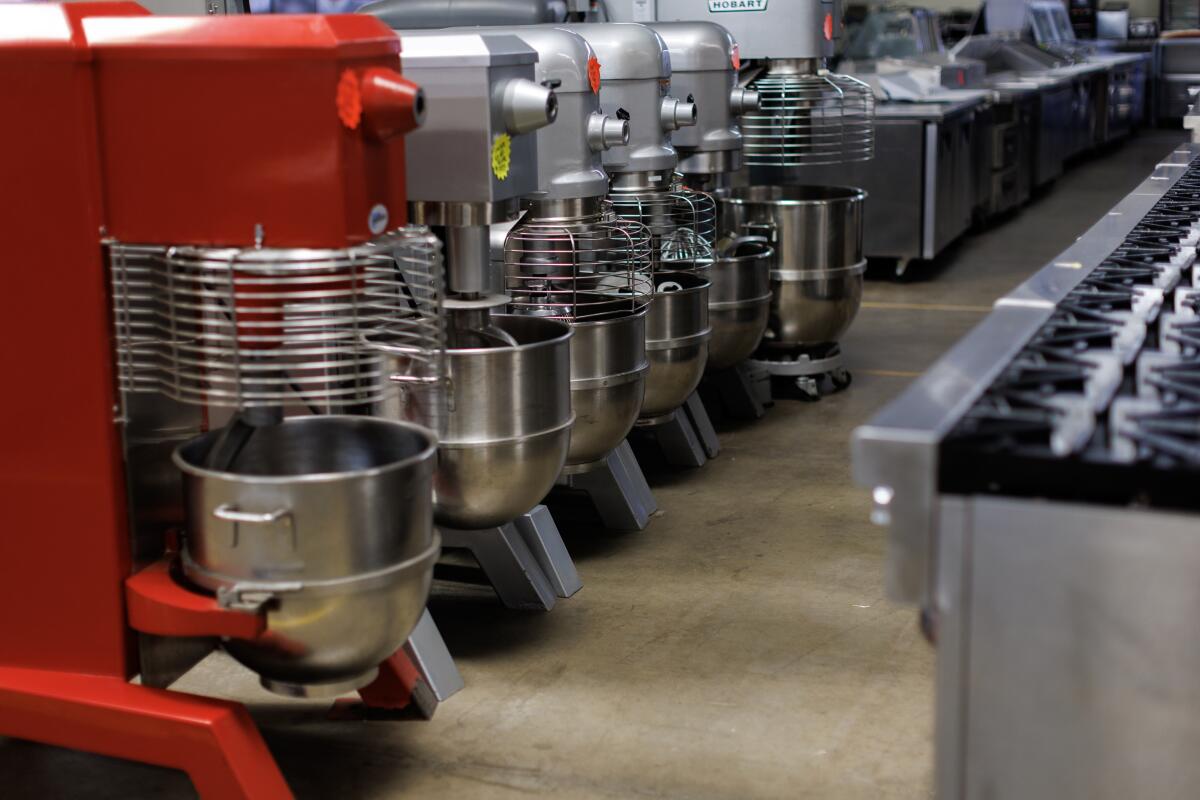
Reconditioned mixers are offered for sale at Fred Bush & Associates in Corona.
(Gina Ferazzi / Los Angeles Times)
The proprietor was grateful Bush understood.
“Tough business, really tough,” he intoned on his way out.
A restaurant closure is almost universally seen as bad news. But not necessarily from Bush’s vantage point. That’s because he deals in used equipment and furniture, buying stoves, sinks, shelves and the like from owners who’ve thrown in the towel. His Corona-based Fred Bush & Associates meticulously restores the items and sells them at steep discounts from the original retail prices. Recent clients include Cobi’s in Santa Monica, Ca’ Del Sole in Toluca Lake, and the Brentwood Italian spots Toscana and Divino. He’s also worked with chains including Starbucks and Rubio’s Coastal Grill.
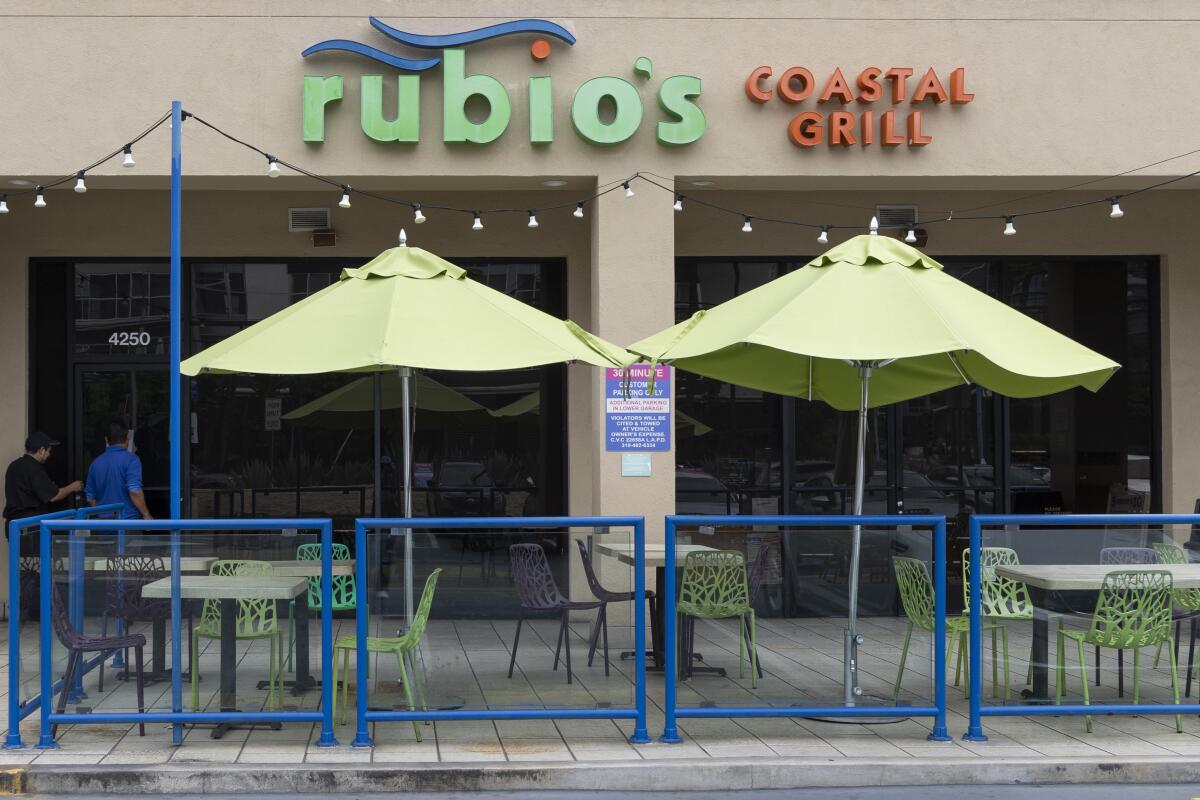
Rubio’s Costal Grill, a client of Fred Bush, said in June it would close nearly 50 locations.
(Zoe Cranfill/Los Angeles Times)
These days, the drought settling over the restaurant landscape is, in a way, a boon for Bush: His 26,000-square-foot showroom brims with merchandise.
“We literally get a call a day from a restaurant that is closing,” said Bush, 76, explaining that he’s running out of space at his warehouse. “I never turn down anything good.”
Bush, who’s been in the trade for 40-plus years, prefers to focus on the positive as he goes through pained visits with owners of cratering eateries: The wares that he buys and later sells help people pursue their entrepreneurial dreams.
“It’s a tough business because you’re catching people at their lowest — but you’re in it to make money,” said Kevin Lanouette of KL Kitchen Supplies, a Canyon Lake, Calif.-based supplier of new restaurant equipment. “[Bush’s] bedside manner has got to be good. It’s not something I would look forward to.”
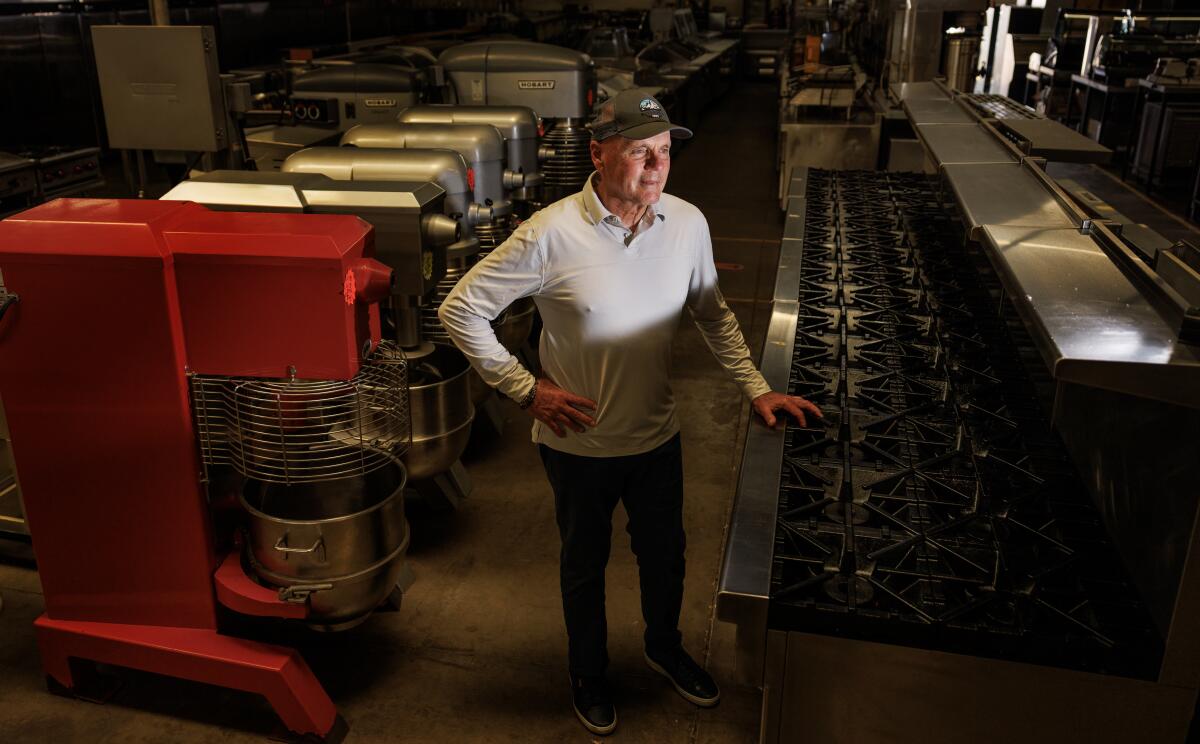
Fred Bush’s Corona showroom brims with used restaurant equipment.
(Gina Ferazzi / Los Angeles Times)
Bush said that when he meets with proprietors, they often are in a good mood, pleased their ordeal is nearing its end. And he takes pleasure in that part of the job. But the Inland Empire pizzaiolo hadn’t seemed at ease. Still, Bush was adamant the man would soon find peace. Bush ultimately offered $4,500 for the bulk of his equipment, about 30 items in all.
He estimated the wares had cost the owner at least $75,000. Once they were restored, Bush would list them at prices totaling about $15,000.
As of mid-July the man hadn’t accepted, Bush said, and no one was answering the phone at the pizzeria.
‘Pretty much brand new’
Bush’s business is a key cog in the Southern California restaurant industry: People working in the space said they knew of no other used equipment dealer on his level.
He grew up in West L.A. and got into the business in 1976, working with a partner to buy secondhand restaurant equipment at auction and resell it. But the partnership was rocky, and he struck out on his own in 1982.
Two years later, Bush was tapped by the organizers of the Olympic Games in L.A. to remove five temporary kitchens that had been built across the region to feed the athletes who were competing. He purchased the equipment and was able to quickly resell it, owing in part to its pristine condition.
“Everything was two weeks old,” Bush said.
Not everything that passes through his warehouse doors arrives so clean. In fact, much of the gear is filthy. But Bush takes pride in refinishing wares so that they look “pretty much brand new.”
Many items are sold for less than half their retail price and come with a 30-day warranty. Bush, for example, recently listed a Montague Co. convection oven for $9,500 — far below its original price of roughly $21,000. He said he’d paid about $2,500 for it.
On a recent tour of his company’s facility, Bush pointed out the booth where equipment is repainted, and a sheet metal shop where stainless steel parts are fabricated. All items are disassembled, cleaned, and rebuilt as needed. A Hobart mixer that was ready to be delivered to a customer shined next to a row of the same model that had yet to be repaired. They were coated in grease and grime.
“We totally recondition everything,” said Bush.
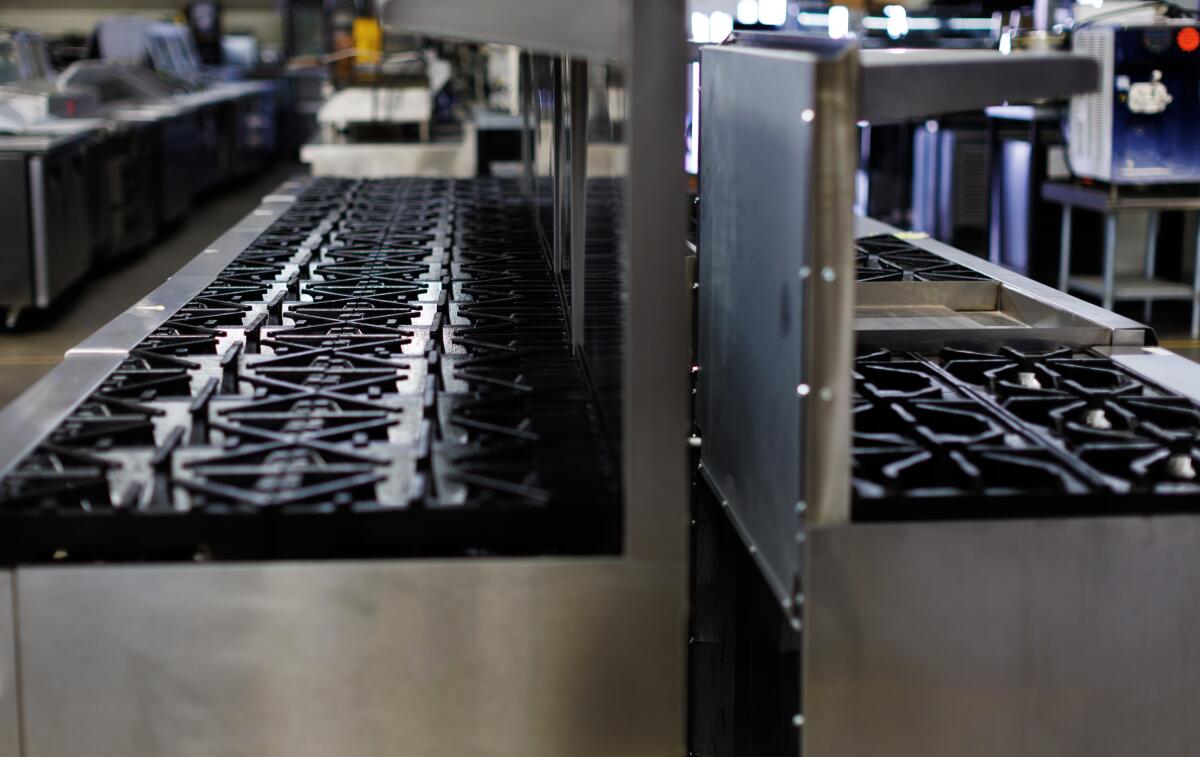
Restored ranges at Fred Bush’s showroom.
(Gina Ferazzi / Los Angeles Times)
Joaquin Caldera, vice president of Fred Bush & Associates, has worked for the company since 1991 and is a big reason it is able to bring almost any piece of ragged gear back to life, Bush said. The walls of Caldera’s office are covered in dozens of clear baggies filled with the parts of equipment on which he commonly works, a testament to Bush’s boast that Caldera “can repair anything.”
George Qualls, operations manager for a barbecue restaurant company, recently worked with Bush to outfit a handful of locations of the chain in San Diego County.
But the first time Qualls saw the sorry state of the equipment taken in by Bush — specifically a grubby charbroiler — he was shocked.
“He showed it to me, and gave me a price, and I said, ‘Fred, really?’” Qualls recalled. “And he said, ‘No, no, it’s not going to look like that.’ I went back four days later, and it looked like a brand-new piece of equipment. It was really crazy.”
Qualls bought the charbroiler for $550 — about a quarter what it would have cost new.
Devoted to diners
Bush lives and breathes restaurants: He invests in them, is friends with proprietors.
He said he’s even furnished his two grown children’s homes with used restaurant furniture. They benefited, he said, when Starbucks was closing stores about a decade ago and needed to unload armchairs, coffee tables and sofas.
“My kids would want to see what we got from Starbucks and put it in their houses,” he said. “Most of the stuff … was [like] new.”
Bush is often on the road, looking in on places that are shutting down so that he can assess their equipment. He logs heavy miles: during a two-day span in June, he went from Upland to Brentwood to Lake Forest. Some of the visits are purely happy ones: Bush also buys equipment when restaurants are remodeling or expanding.
Still, he regularly tours troubled establishments — and sometimes before their plans to shutter have been announced. As such, he may know the fate of a restaurant ahead of its employees or the public.
Indeed, Bush said that days before the Rubio’s chain announced in June that it was closing 48 restaurants in California, he had visited one location at the company’s behest to make a survey of what equipment he would buy.
He now has some of the chain’s chairs for sale. They’re available for $20 apiece.
Dreaming in a down market
During the visit to Bush’s Corona showroom, a handful of prospective customers perused neat aisles of mostly stainless steel equipment gleaming under florescent lights: refrigerators, convection ovens, steam kettles, fryers, griddles, blast freezers, ice machines, stoves, broilers, mixers, coffee makers, dishware, utensils, tables, chairs, and more.
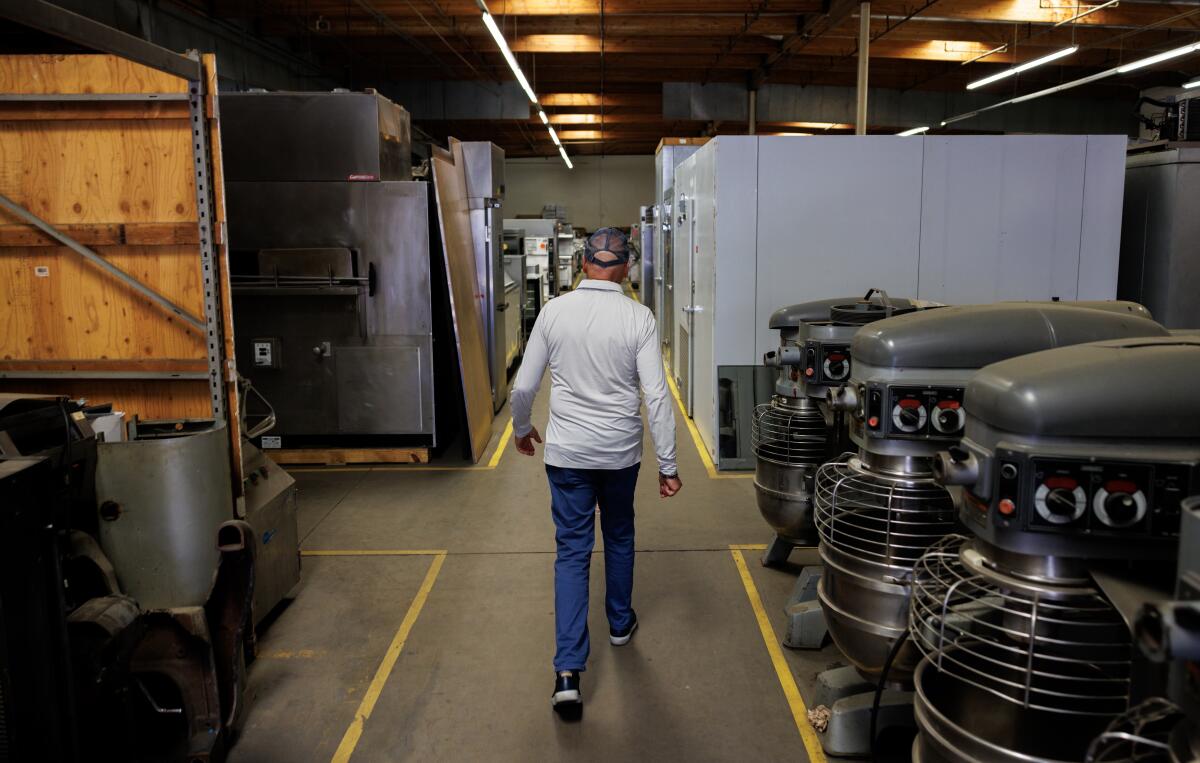
Fred Bush has been in the used restaurant equipment business for more than 40 years.
(Gina Ferazzi / Los Angeles Times)
Bush pointed out an enormous piece of decorative wood that he’d purchased from a Japanese restaurant in South Coast Plaza. He’d been having trouble selling it. “It probably weighs 500 pounds,” he said.
Then he ran into Sam Harris, co-owner of Sherman’s Deli & Bakery in Palm Springs. He’d recently bought an ice machine from Bush and had come back to check out ovens.
“I always come in here and leave with something,” Harris said.
In a tough economy, repeat customers — especially those with existing eateries — are key. Though the current climate for restaurants has helped Bush build his inventory, it also means that there are fewer new restaurants opening. And that means lower sales.
Lanouette, whose clients have included Republique and the Hotel Bel-Air, said that when projects he’s working on call for used equipment, he sources it from Bush. And in today’s economy, when expediency is key, refurbished wares often fit the bill.
“Times being what they are … it’s all about getting the doors open and putting money back into [a restaurateur’s] pocket,” Lanouette said. Bush’s merchandise is “very helpful to a lot of my clients who don’t have deep pockets but have a dream.”
There will always be people chasing that dream of opening a restaurant. Bush believes it’s innate in some people — they just want to feed others.
“They’ve gotta keep trying,” he said. “And, ultimately, we all have to eat.”
Source link













